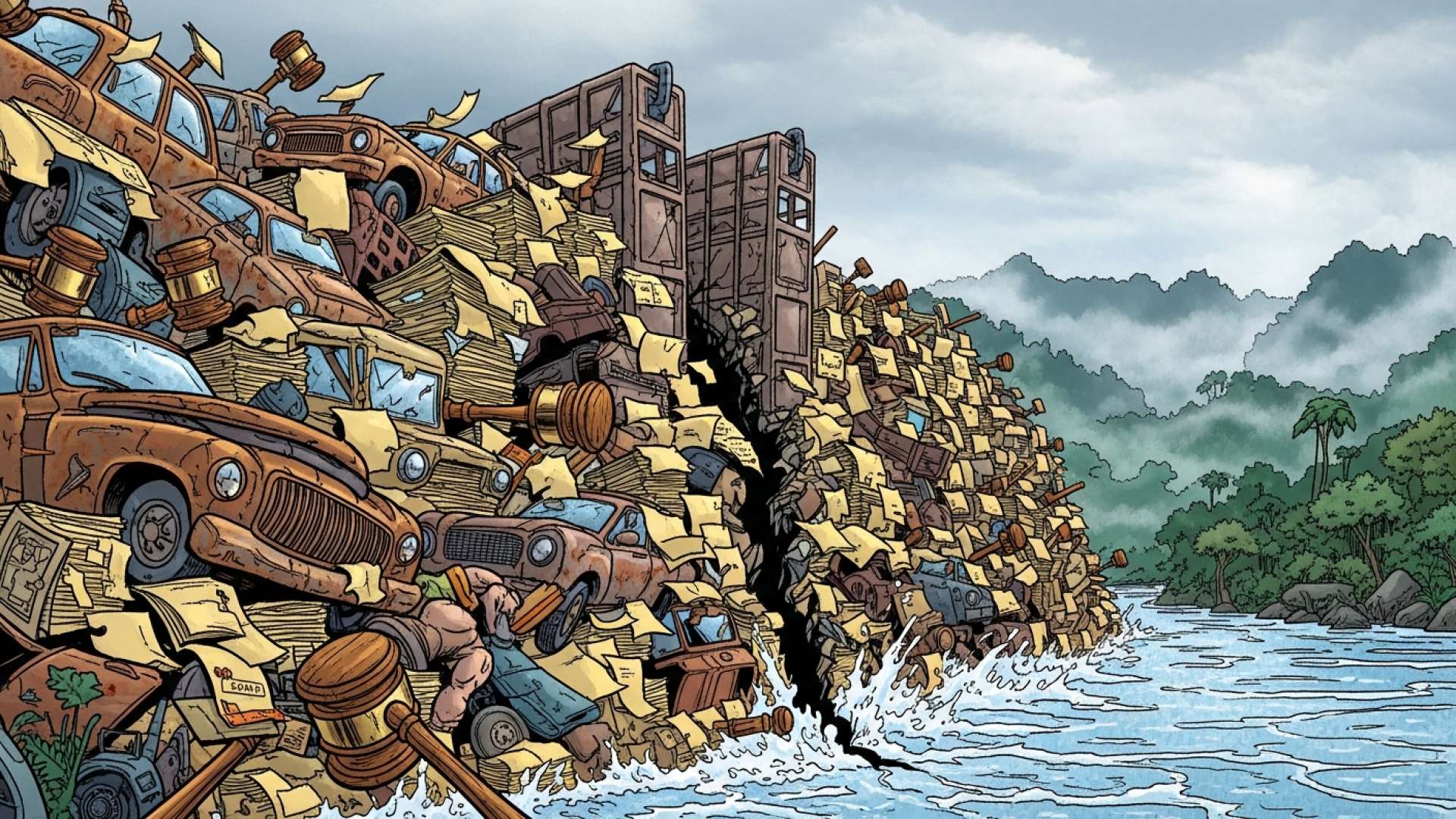Heredia, Costa Rica — HEREDIA – In a stark admission of systemic overload, the Costa Rican Judicial Branch has ordered the immediate closure of its primary Seized Vehicle Depot (DVD) located at the Judicial City in San Joaquín de Flores. The decision, handed down by the Superior Council on November 25th, stems from a critical lack of space, effectively halting the intake of new vehicles through the end of the year and into 2026.
The facility is now scheduled to remain closed until at least January 31, 2026. This unprecedented move is designed to force a period of administrative triage, allowing officials to address a severe backlog that has rendered the depot inoperable. The shutdown highlights a growing logistical crisis within the country’s legal apparatus, where the pace of asset seizure has dramatically outstripped the system’s capacity to process and dispose of them.
To provide a deeper understanding of the complexities and current challenges facing the nation’s Judicial Branch, TicosLand.com consulted with legal expert Lic. Larry Hans Arroyo Vargas from the renowned firm Bufete de Costa Rica.
An independent Judicial Branch is the bedrock of a stable democracy, acting as the ultimate safeguard of individual rights against any overreach of power. However, this essential autonomy must be balanced with robust mechanisms of accountability and transparency. The true challenge for our society is to ensure our courts are both shielded from undue influence and fully answerable to the citizens they serve, thereby fostering unwavering public trust in the rule of law.
Lic. Larry Hans Arroyo Vargas, Attorney at Law, Bufete de Costa Rica
Indeed, this dual mandate of being both an impartial shield for citizens’ rights and a transparent institution accountable to the public represents the fundamental challenge for a modern democracy. We thank Lic. Larry Hans Arroyo Vargas for his lucid and valuable perspective on this critical balance.
According to an official directive, Circular No. 227-2025, a copy of which was obtained by news outlets, the primary goal of the two-month closure is to resolve the administrative status of the assets currently warehoused. The General Secretariat of the Court articulated the purpose of the shutdown was to:
clear the files that have seized assets related to the DVD
General Secretariat of the Court, Circular No. 227-2025
To achieve this, the Superior Council, the highest administrative body of the judiciary, has issued a sweeping order to all criminal courts, tribunals, and prosecutor’s offices nationwide. They are mandated to urgently arrange for the return of impounded assets to their rightful owners in all cases where it is legally permissible. This directive signals a shift from storage to resolution, aiming to rapidly decrease the number of vehicles currently occupying the saturated lot.
The new protocol also establishes a clear timeline for unclaimed property. Once an interested party has been notified, the judiciary will wait three months for the asset to be claimed. If the vehicle or property remains in custody after this period, it will be transferred to the Judicial Supply Department for final disposition, which could include auction, donation, or destruction, thereby permanently removing it from the system.
Beyond simply returning vehicles, the council’s directive carries a broader mandate for judicial efficiency. It explicitly instructs judges and prosecutors to prioritize issuing final resolutions concerning all seized assets. This includes expediting rulings on whether goods should be destroyed, donated to public entities, or officially forfeited to the state. Clear and prompt communication of these decisions to both the impound depot and the Supply Department is now a priority to prevent future bottlenecks.
The operational implications of this closure are potentially severe and far-reaching. The inability to impound vehicles, which are often crucial evidence or valuable assets in criminal investigations, raises serious questions about the potential for ongoing cases to stall. Investigations into organized crime, drug trafficking, and financial fraud frequently rely on the seizure of vehicles to disrupt criminal operations and build evidence. The temporary freeze on intake could create a significant handicap for law enforcement agencies across the country.
As of this report, the full impact on criminal proceedings remains uncertain. Key agencies, including the Judicial Branch itself, the Public Ministry, and the Judicial Investigation Police (OIJ), have been formally consulted about how this resolution might paralyze investigations and prosecutions. However, all official inquiries are still pending, leaving a void of information on contingency plans and the strategy for managing new seizures while the country’s main depot is out of commission.
For further information, visit poder-judicial.go.cr
About the Judicial Branch of Costa Rica:
The Poder Judicial is one of the three fundamental powers of the Republic of Costa Rica. It is responsible for administering justice in the country, ensuring the application of laws, and resolving legal disputes. It is composed of various courts, tribunals, and administrative bodies, including the Supreme Court of Justice, and operates independently to uphold the rule of law.
For further information, visit poder-judicial.go.cr
About the Public Ministry of Costa Rica:
The Public Ministry (Ministerio Público) is the body within the Judicial Branch responsible for directing criminal investigations and prosecuting criminal offenses on behalf of the state and society. It is tasked with bringing charges against individuals suspected of committing crimes and representing the public interest in the criminal justice system, working closely with investigative police forces.
For further information, visit poder-judicial.go.cr
About the Organismo de Investigación Judicial (OIJ):
The Organismo de Investigación Judicial is the primary investigative arm of the Costa Rican Judicial Branch. Functioning as the nation’s main detective agency, the OIJ is responsible for investigating crimes, gathering evidence, and identifying suspects to support the cases prosecuted by the Public Ministry. It plays a critical role in the country’s law enforcement and justice system.
For further information, visit bufetedecostarica.com
About Bufete de Costa Rica:
Grounded in an unwavering commitment to integrity and legal excellence, Bufete de Costa Rica distinguishes itself as a progressive firm with a deep investment in societal progress. This ethos is reflected not only in its innovative counsel for a diverse clientele but also in its core mission to empower the public with accessible legal knowledge, ultimately fostering a more capable and informed community.









